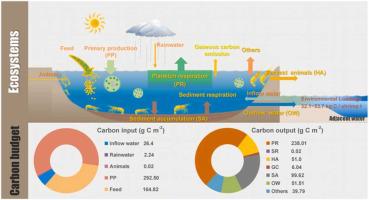Agriculture, Ecosystems & Environment ( IF 6.0 ) Pub Date : 2022-05-04 , DOI: 10.1016/j.agee.2022.107995 Ping Yang 1, 2, 3 , Kam W. Tang 4 , Hong Yang 5 , Chuan Tong 1, 2, 3 , Nan Yang 1 , Derrick Y.F. Lai 6 , Yan Hong 1 , Manjing Ruan 1 , Yingying Tan 1 , Guanghui Zhao 1 , Ling Li 1 , Chen Tang 1

|
Small-hold aquaculture ponds are widespread globally, but their carbon greenhouse gas emissions are poorly quantified. In this study, we used a carbon budget approach to assess the climate footprint of three earthen aquaculture ponds in southeastern China with the whiteleg shrimp (Litopenaeus vannamei) during the farming period. The main carbon inputs to the ponds were planktonic primary production (58.5–61.8%), followed by commercial feeds (31.9–35.3%), while the major carbon outputs occurred through planktonic respiration (44.0–53.6%) and sedimentation (18.0–21.7%). Water-to-air emissions of carbon greenhouse gases (CO2 and CH4) represented only a small fraction of the carbon flow (0.8–1.6%), with a combined CO2-equivalent emission of 528.4 ± 193.3 mg CO2-eq m−2 h−1 based on GWP20. We also observed significant spatio-temporal variation in carbon greenhouse gases among the three ponds, which could be attributed to the variation in Chl-a and carbon substrate supply. Nevertheless, the magnitude of CH4 emission from these ponds was still higher than some other agro-ecosystems. Moreover, we found that only 21% of the excess organic carbon was converted to shrimp biomass, while another 20% ended up in the sediment. Our findings suggested that lowering the feed conversion ratio and removing the bottom sediments regularly could help improve production efficiency, reduce the excessive accumulation of carbon-rich detritus and minimize the climatic warming impacts of aquaculture production.











































 京公网安备 11010802027423号
京公网安备 11010802027423号